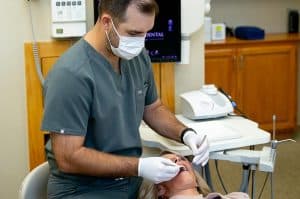Understanding How Sedation Dentistry Interacts with Our Bodies
For many patients, dental procedures bring anxiety, discomfort, or even fear. IV sedation offers a safe and effective way to promote relaxation during treatment. At Lexington Dental of Owasso, we provide IV sedation to help dental patients feel calm and at ease while receiving the care they need. This method is particularly beneficial for those undergoing extensive procedures or struggling with dental anxiety.
Patients from Owasso, Collinsville, Claremore, and Catoosa trust us for comfortable, stress-free dental experiences. If you’ve ever wondered how IV sedation works and how it affects the body, this guide will explain its impact on the nervous system, its safety, and what to expect before and after the procedure.
If you’re ready to experience stress-free dentistry, call Lexington Dental today at (918) 274-8500 to schedule your consultation. Our Owasso dental team is here to provide gentle, effective care for patients.
How IV Sedation Works in the Body

IV sedation, or intravenous sedation, involves administering sedative medication directly into the bloodstream through a small catheter. This allows for fast-acting effects, helping patients enter a deeply relaxed state within minutes. Unlike general anesthesia, IV sedation does not render a patient completely unconscious. Instead, it induces a dream-like state where patients remain responsive but free from anxiety or discomfort.
The primary goal of IV sedation is to slow down the central nervous system. It works by enhancing the effects of gamma-aminobutyric acid (GABA), a neurotransmitter responsible for calming brain activity. As GABA levels increase, the patient experiences reduced awareness of their surroundings and a sense of deep relaxation.
The Effects of IV Sedation on the Nervous System
IV sedation primarily targets the central nervous system (CNS). The CNS, composed of the brain and spinal cord, controls various bodily functions, including consciousness, sensation, and movement. Sedative medications administered intravenously work by depressing the activity of the CNS. This depression leads to a relaxed state, reducing anxiety and promoting comfort.
Once IV sedation takes effect, it influences multiple systems in the body:
-

Cognitive Function: Patients often feel drowsy and have little to no memory of the procedure. This amnesia-like effect is beneficial for those with dental anxiety.
- Heart Rate and Blood Pressure: Sedation can help stabilize blood pressure and reduce stress-induced spikes, promoting a smoother procedure.
- Pain Perception: While IV sedation does not replace local anesthesia, it helps the brain interpret pain signals differently, significantly lowering discomfort levels.
- Muscle Relaxation: Patients remain still throughout the procedure, allowing the dentist to work efficiently without sudden movements or reflex responses.
Physiological Changes During IV Sedation
Intravenous sedatives induce several physiological changes:
- Reduced Anxiety: The medication’s impact on the brain’s anxiety centers leads to a significant reduction in feelings of fear and worry.
- Muscle Relaxation: Sedatives can cause muscle relaxation, which can be helpful during dental procedures.
- Decreased Awareness: While you will likely remain conscious (depending on the level of sedation), your awareness of your surroundings may be diminished. This helps you feel less anxious and more comfortable.
- Amnesia: One common effect of IV sedation is anterograde amnesia, which means you may have little to no memory of the procedure afterward. This is often considered a benefit, as it reduces any potential negative memories associated with the dental chair.
- Slowed Breathing and Heart Rate: Sedatives can slow down breathing and heart rate. This is why careful monitoring of vital signs is essential during IV sedation.
- Reduced Salivation: Some sedatives can reduce saliva production, which can be helpful during dental procedures.
Call us today at (918) 274-8500 to schedule your consultation. Whether you’re in Owasso, Collinsville, Claremore, or Catoosa, we welcome you to experience comfortable, patient-focused care.
Monitoring During IV Sedation at Lexington Dental
Throughout the IV sedation procedure, your vital signs are continuously monitored. These include:
- Heart Rate: Monitors the regularity and strength of your heartbeat.
- Blood Pressure: Measures the force of blood against the artery walls.
- Oxygen Saturation: Measures the percentage of oxygen in your blood.
- Respiration Rate: Monitors the number of breaths you take per minute.
This continuous monitoring helps ensure your safety and allows the dental team to adjust the level of sedation if needed.

Experience Comfortable Dentistry With IV Sedation
Don’t let severe dental anxiety prevent you from achieving a healthy, beautiful smile. Whether you need oral surgery or routine dental treatment, Lexington Dental of Owasso offers advanced IV sedation to help you feel relaxed and at ease during your dental procedure.
Reach out to us at (918) 274-8500 to learn more or book an appointment. Patients from Owasso, Collinsville, Claremore, and Catoosa trust us to provide gentle, sedation-assisted dental care for a stress-free experience. Let us help you take the next step toward better oral health today!






